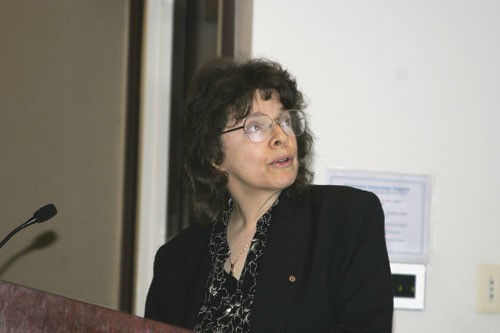
Back to the past (Photo by Austin kilgore, Daily Campus)
The Fred Wendorf Distinguished Lecture Series in Archaeology hosted its second guest speaker, Dr. Joyce Marcus, this Wednesday. A Robert L. Carneiro Distinguished University Professor at the University of Michigan, Marcus lectured on the “Co-Evolution of War and Society in Ancient Mexico,” describing how agricultural surplus and growing populations led to group raids in stone-age Mexico.
“Why did some societies have group violence, while others didn’t?” Marcus asked. She explained that communities that were large enough to divide into social groups were more likely to have group violence.
San Jose Mogote, Mexico, is the site of Marcus’ current study. Over the last 15 years, Marcus and her partners have excavated burial sites and temples, all of which add new layers to the current knowledge of ancient warfare.
During her lecture Marcus showed slides of unearthed skeletons, buried pottery and the foundations of ancient homes and temples. She also displayed maps of ancient cities throughout the Copan Valley in Mexico, where wars and staged raids occurred.
“These early states professionalized war,” Marcus said. “Raiding became a tool used by chiefs in their quest for prestige, manpower and resources.”
According to Marcus, the only cities that waged war were the ones that were rich enough to have enemies. In poorer areas, groups were forced to work together for food and resources.
Marcus’ research looks at changes in human social organization, often addressing the topic of “community self-sufficiency” versus “community specialization.” She also studies the development of centralized states and empires.
Marcus’ fieldwork has focused on the ancient civilizations of Central and South America, principally in Peru, the Mexican state of Oaxaca, and the Mayan areas of Mexico and Guatemala.
Marcus received her Ph.D. from Harvard University in 1974. She lists her research interests as sociopolitical organization, Mesoamerican archaeology, with an emphasis on Maya and Zapotec, and the origins of writing, art, religion and ritual.
In 2003, Marcus was honored by the Mexican state of Campeche for 30 years of research in the area.
According to the National Academy of Science, “[Marcus’] archaeological research in Peru has helped explain the transition from self-sufficient farming/fishing communities to pre-Columbian cities.” She was elected a member of the NAS in 1997.
Marcus is considered a pioneer in the use of archaeological data in conjunction with hieroglyphic texts and ethno-historical accounts. Through the development of these methods and her years of research, Marcus has “brilliantly advanced our knowledge of the organization and evolution of ancient Mesoamerican states,” according to the NAS.
In addition to being a professor of archeology at the University of Michigan, Marcus serves as the curator of Latin American Archaeology for the University’s Museum of Archeology. She is also an Elman R. Service Professor of Cultural Evolution.
Marcus has authored or edited more than a dozen books and written over 100 articles and book chapters on the subject of Mesopotamian archeology.
“Warfare can create states-[and] lead to their destruction,” Marcus said, explaining why the study of archeology and the formation of Mesoamerican societies is such a “hot topic.” She challenged the students of SMU to continue research and bring a new perspective to the field.








